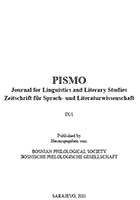Glagoli govorenja i tekst
Verbs of Speaking and Text
Author(s): Lada BadurinaSubject(s): Language and Literature Studies
Published by: Bosansko filološko društvo
Keywords: glagoli govorenja; mišljenja i/ili osjećanja; (znanstveni) tekst; standardi/kriteriji tekstualnosti; kohezija; intertekstualnost
Summary/Abstract: Verbs of speaking, thinking and/or feeling (Lat. verba dicendi, sentiendi, afectuum et voluntatis) are usually interpreted in grammar books as those that express that someone is saying, thinking or feeling something (e.g. reći, kazati, izjaviti, govoriti, iskazati, pitati, upitati, velim, smatrati, misliti, raspravljati, zaključiti, etc.). Closely related to the semantics of this group of verbs is their syntactic characteristic – they open space for various complements, but also for a subordinate clause, e.g. Izrekao je glupost; Pitao ju je za savjet; Rekao je d a d olazi; Govorio im je ono što su željeli čuti; Upitao se kako je to moguće; Možemo zaključiti da je takav pristup novost u našoj struci; Poručio je: to je moja briga…etc. By starting from the viewpoint that the complex sentences – both subordinated and coordinated – are a fact of text, we will consider the role of verbs of speaking in the development of text and its organisation. We will take into account structures whose meaning is that of speaking, thinking, feeling, perceiving, etc. (e.g. to nas vodi prema zaključku… or njegov je zaključak prihvatljiv… with zaključujemo; mogla bih se prikloniti mišljenju… w ith smatram etc.). Intertextuality as an immanent characteristic of any text will be brought into connection with the verbs (and structures) of speaking, and this will be analysed on the bases of scientific texts (starting from the assumption that the inventory of verbs of speaking, thinking and perceiving and structures with such meanings is richer in this type of texts).
Journal: Pismo - Časopis za jezik i književnost
- Issue Year: 2011
- Issue No: 09
- Page Range: 125-137
- Page Count: 13
- Language: Croatian

